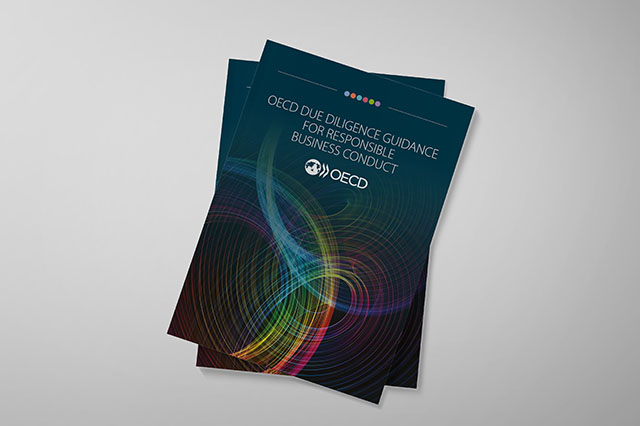Responsible Business Seminar Series kicks off with a discussion of ‘due diligence’

On 5 July, Myanmar Centre for Responsible Business (MCRB) together with the Directorate of Investment and Companies Administration (DICA) and the Organisation for Economic Co-operation and Development (OECD) held the inaugural event for a new series of Responsible Business Seminars.
The event was used to launch in Myanmar the new OECD Due Diligence Guidance for Responsible Business Conduct adopted in May 2018, and Heineken and Shwetaung shared their experience of undertaking this kind of ‘due diligence’.
Over 80 participants attended, including DICA officials, the Union of Myanmar Federation of Chambers of Commerce and Industry (UMFCCI) and Myanmar National Human Rights Commission (NHRC) representatives, embassies, chambers of commerce, Myanmar and foreign companies, international organisations, lawyers advising investors and the government on investment in Myanmar.
In her welcoming remarks, Inga Makusheva, MCRB’s Programme Manager, introduced the upcoming series of responsible business workshops which will cover issues such as business integrity, working conditions, inclusion and non-discrimination, and environmental stewardship. These are all issues covered in the benchmark international standards for investment such as those of the UN, World Bank and OECD.
On behalf of the government, DICA Deputy Director General, U Than Aung Kyaw updated the audience on responsible business conduct (RBC), the 2016 Investment Law, and the 2nd Investment Policy Review being conducted by the Myanmar Government with the OECD. He stressed the importance of RBC and related requirements in Myanmar laws. He also spoke about the Myanmar Investment Commission’s increased emphasis on business identifying and mitigating their environmental and social impacts, and operating sustainably. He reminded the audience of the importance of transparency and that companies with MIC Permits were required by law (Myanmar Investment Rules, Rule 196) to submit their annual reports and publish them on their websites, noting that to date, DICA has so far received only 10 such reports. He also drew attention to the new focus on business conduct in the latest set of amendments of the Anti-Corruption Law and that DICA and MIC would be working closely with the Anti-Corruption Commission. He concluded his speech by thanking OECD for undertaking a second Investment policy review (following on from the one published in 2014) and for OECD’s ongoing partnership with DICA and MIC.
Tihana Bule, Economist from the Directorate for Financial and Enterprise Affairs of the Organisation for Economic Co-operation and Development introduced the new OECD Due Diligence Guidance for Responsible Business Conduct which provides practical support to businesses and offers plain language explanations of due diligence recommendations and associated provisions included in theOECD Guidelines for Multinational Enterprises. The guidance also helps companies implement the recommendations in the UN Guiding Principles on Business and Human Rights and the ILO Tripartite Declaration for Multinational Enterprises which are aligned with the OECD Guidelines.
Holly Bostock, Heineken Myanmar’s Corporate Affairs Director, explained how Heineken used due diligence in all its areas of work to develop its Human Rights Action Plan and ensure responsible business from ‘barley to bar’. She stressed the importance of collaborating with stakeholders and sharing experience.
Giuseppe Sardone, Chief Operating Officer of Shwe Taung Group shared their experience of embarking on due diligence for the first time two years ago. This included developing a Code of Conduct and training employees on it. He outlined the various 3rd party assessments the Company had commissioned for their Apache Cement Plant, and the challenges they had faced in doing adequate public consultation. During the last two years, they had increased their communication efforts, publishing company reports, and establishing information centres and suggestion boxes in all communities affected by the company’s operations. He agreed with Heineken on the value of sharing experience and learning from peers.
Future responsible business seminars will be held in co-operation with the International Labour Organisation (ILO), interested companies and business associations and with the involvement of Myanmar Investment Commission (MIC) and DICA. The concept was discussed with MIC on 22 June, together with a group of companies committed to sharing their experience.
The seminars, which are intended to share practical experience of how to do business responsibly in Myanmar, as well as the challenges, will be shaped by the interest from businesses and others. They are intended to help all types of businesses to operate responsibly, consistent with Myanmar’s Investment Law and Policy. Speakers will be drawn from companies and other experts (e.g. from the OECD, ILO, and others). The main target audience for these seminars will be managers in both Myanmar and foreign businesses of various sectors and sizes, including businesses beyond Yangon. Government officials who work with businesses will also be invited, not just those from DICA.
 English
English မြန်မာ
မြန်မာ မြန်မာ (unicode)
မြန်မာ (unicode)










